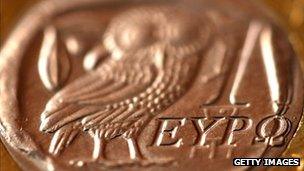Greece debt write-off talks with banks stall
- Published

The Greek government has said that it will have to abandon the euro if it fails to secure new loans
Talks between Greece and its private sector lenders over a possible 50% write-off of its debts have stalled.
Reaching a deal is a pre-condition for Athens receiving the next chunk of bailout cash from the International Monetary Fund and European Union.
Without that money, the Greek government could run out of cash and be forced to leave the euro.
Meanwhile, markets fell on rumours that France and other governments were about to have their credit ratings cut.
European stock markets dropped by 1%-2% as the news spread in mid-afternoon trading, while the euro hit a 16-month low against the dollar of $1.263.
'Paused for reflection'
The committee representing Greece's lenders said that some parties had not responded constructively to the proposed 50% debt write-off.
It said discussions were "paused for reflection on the benefits of a voluntary approach" without stating when they would resume.
The alternative to a voluntary debt write-off is likely to be an outright default by Greece - a failure to continue repaying its debts, perhaps as soon as March, when the country faces a 14.4bn euro ($18.2bn, £11.9bn) debt repayment.
Another alternative may be for the Greek government to pass a law unilaterally changing the terms of its debt repayments, as nearly all of its debts are governed by Greek law.
In its statement, external, the steering committee of the Institute of International Finance (IIF) - an industry body for global banks - praised the Greek government's leadership.
Some of Greece's debts are reported to have been bought up on the cheap by so-called vulture funds - speculators who specialise in pursuing troubled borrowers for payment in full.
A common tactic of vulture funds is to veto agreements between distressed borrowers and their main lenders, in the hope of winning special treatment for their own loans.
IMF role
However, a Greek government source quoted by news agency Reuters put the blame on the International Monetary Fund.
It was accused of insisting that Greece pay just 4% interest on its debts as part of the deal - considered far too low by many lenders.
The IMF and European Union have insisted that private sector lenders take losses as a precondition to them providing any further rescue loans to Greece.
The IMF played down the significance of the pause in talks.
"We look forward to the resumption of talks between Greece and its creditors," the Fund said.
"It is important that this lead to a [private sector involvement] agreement that, together with the efforts of the official sector, ensures debt sustainability."
The European Central Bank - which has bought up a significant share of Greece's debts as part of efforts to rescue the country - is not participating in the talks and will not accept any write-off of the debts it holds.
Euro exit
If agreed, the debt restructuring is expected to give Greece longer to repay its debts, as well as cutting the amount due.
It will also contain a clause that prevents minority lenders, such as vulture funds, from vetoing future restructuring agreements.
Last week, a Greek government spokesman said that if Athens failed to secure its latest bailout money from the EU and IMF - for which the deal with private sector lenders is a condition - it would be forced to exit the euro.
The Greek government is struggling with public opposition to new austerity measures, demanded by official lenders, including the IMF.
The prime minister warned last week that Greece may run out of cash to meet its debt payments as soon as March if unions do not agree to further spending cuts.
EU, International Monetary Fund and European Central Bank inspectors are due in Athens later in January to review progress.
Greek debts are currently valued at only 20% of face value by bond markets - implying that markets expect total losses ultimately to be 80% of the amount lent, and not the 50% currently under discussion.
- Published13 January 2012
- Published20 December 2011
- Published4 January 2012
- Published3 January 2012